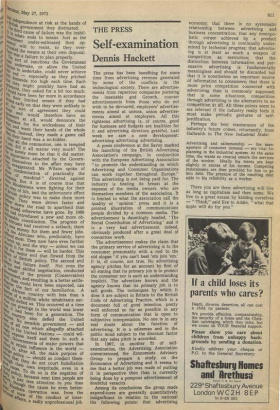THE PRESS
Self-examination
Dennis Hackett
The press has been benefiting for some time from advertising revenue generated by some of the conflicts in the technological society. There are advertisements from rapacious companies pursuing the insatiable god Growth, counter advertisements from those who do not wish to be devoured, employers' advertisements aimed at unions, union advertisements aimed at employers. All this righteous advertising is, of course, good for business and budgets are healthier for it and advertising directors grateful. Last week we saw a new development: advertising advertising advertising. A press conference at the Savoy marked the launching of the British Advertising Association's campaign, in conjunction with the European Advertising Association "to promote the understanding on which Advertising and Consumer Organisations can work together throughout Europe." This advertising is not being paid for. The industry is beating its breast at the expense of the media owners who are themselves members of the association. It is limited to what the association call the quality or ' opinion ' press and it is a pointed illustration of communications people divided by a common media. The advertisement is dauntingly headed, ' The Social Contribution of Advertising' and it is a very bad advertisement indeed, obviously produced after a great deal of committee work. The advertisement makes the claim that the primary service of advertising is to the consumer presumably with a nod to the old slogan if you can't beat 'em join 'em.' It is, of course, not true. No advertising agency pitches for an account by first of all stating that its primary job is to protect the consumer nor is such an understanding implicit. The advertiser knows and the agency knows that its primary job is to sell goods. The techniques by which it does it are subject in Britain to the British Code of Advertising Practice, which is a document full of good intention, pretty well enforced so far as possible in any form of communication that is open to subjective interpretation. No one is in any real doubt about the function of advertising. It is a salesman and in the public mind subject to the discount factor that any sales pitch is accorded. In 1967, in another fit of selfexamination, the Advertising Association commissioned the Economists Advisory Group to prepare a study on the Economics of Advertising and it seems to me that a better job was made of putting it in perspective then than is currently being done by a pompous advertisement of doubtful veracity. Among its conclusions the group made expenditures are generally quantitatively insignificant in relation to the national the following points: that advertising economy; that there is no systematic relationship between advertising and business concentration; that any monopo listic corner achieved by a product through advertising is continually under mined by technical progress; that advertising is at least as much a weapon of competition as restriction; that the distinction between informative and persuasive advertising is fundamentally meaningless and should be discarded but that it is nonetheless an important source of information to consumers; that there is more price competition connected with advertising than is commonly supposed; that in some situations, competition through advertising is the alternative to no competition at all. All these points seem to me relevant if the industry really feels it must make periodic gestures of selfjustification.
Perhaps the best reassurance of the industry's future comes, reluctantly, from Galbraith in The New Industrial State: Advertising and salesmanship the man agement of consumer demand — are vital for planning in the industrial system. At the same time, the wants so created ensure the services of the worker. Ideally his wants are kept slightly in excess of his income. Competing inducements are then provided for him to go into debt. The pressure of the resulting debt adds to his reliability as a worker.
There you are then: advertising will live as long as capitalism and then some. We live to a great extent by kidding ourselves — "Think," said Eve to Adam, "what that apple will do for you."










































 Previous page
Previous page